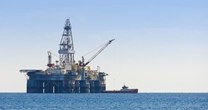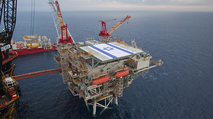21 oct 2016

Hundreds of Jordanians staged a sit-in after Friday prayer outside the National Electric Power Company of Jordan (NEPCO) in protest against the controversial Jordan-Israel natural gas deal.
The protesters chanted slogans and held banners calling for overturning the gas agreement.
A US-led consortium leading the development of Israel's offshore gas reserves announced the deal to sell natural gas from its Leviathan field to Jordan.
US firm Noble Energy, the lead partner, said the contract with the NEPCO was for 45 billion cubic meters over a 15-year term.
The "National Campaign to Overturn the Gas Deal with the Zionist Entity", a broad coalition of civil society groups, activists, lawyers and political groups, is stepping up efforts to protest the agreement despite its finalization.
The protesters chanted slogans and held banners calling for overturning the gas agreement.
A US-led consortium leading the development of Israel's offshore gas reserves announced the deal to sell natural gas from its Leviathan field to Jordan.
US firm Noble Energy, the lead partner, said the contract with the NEPCO was for 45 billion cubic meters over a 15-year term.
The "National Campaign to Overturn the Gas Deal with the Zionist Entity", a broad coalition of civil society groups, activists, lawyers and political groups, is stepping up efforts to protest the agreement despite its finalization.
5 oct 2016

The Jordanian trade unions have called on their government to revoke the $10 billion gas agreement it recently signed with its Israeli counterpart.
This came during a sit-in staged on Tuesday outside the building of trade unions in the Jordanian capital Amman.
The participants in the sit-in carried placards denouncing the gas deal with Israel. Head of the council of unions Ibrahim Attarawneh condemned the deal as “illegal and unconstitutional,” affirming that the unions would use all forms of protest to urge the government not to purchase gas from Israel.
He stressed that “the price of this gas, which has been stolen from Palestine, will come from the pockets of Jordanian tax payers and then will fund Israel’s crimes against the Palestinians.”
This came during a sit-in staged on Tuesday outside the building of trade unions in the Jordanian capital Amman.
The participants in the sit-in carried placards denouncing the gas deal with Israel. Head of the council of unions Ibrahim Attarawneh condemned the deal as “illegal and unconstitutional,” affirming that the unions would use all forms of protest to urge the government not to purchase gas from Israel.
He stressed that “the price of this gas, which has been stolen from Palestine, will come from the pockets of Jordanian tax payers and then will fund Israel’s crimes against the Palestinians.”
27 sept 2016

Jordanian campaigners expressed disappointment after the US-led consortium leading the development of Israel's offshore gas reserves on Monday announced a first deal to sell natural gas from its off-shore Leviathan field to Jordan.
According to i24 News, US firm Noble Energy, the lead partner, said in a statement that the contract signed Monday with the National Electric Power Company of Jordan (NEPCO) was for "300 million cubic feet per day over a 15-year term".
It includes an option to purchase a further 50 million cubic feet up to a total of 350 million daily. "Gross contract revenues are estimated to be approximately $10 billion," it said.
Delivery to NEPCO is expected to begin at the same time as the estimated 22 trillion cubic foot field goes online to domestic clients in 2019 "subject to regulatory approvals from Israel and Jordan", Noble said.
Leviathan, which holds an estimated 22 trillion cubic feet of gas, is operated by US-based Noble Energy and the Israel-based Delek Group.
The partners in the Leviathan project will reportedly continue to pursue long-term agreements with other customers in the eastern Mediterranean, including in Egypt, Turkey and the Palestinian Authority.
Over recent months, the Jordanian National Campaign Against the Gas Agreement with the Zionist Entity (Israel) protested the government’s agreement to import natural gas from Israel, saying the deal represents a moral hazard as well as a threat to Jordanian sovereignty.
According to the campaigners such a deal serves as a sponsor to Israeli terrorism and forces Jordanian citizens to normalize with the Israeli occupation against their will.
According to i24 News, US firm Noble Energy, the lead partner, said in a statement that the contract signed Monday with the National Electric Power Company of Jordan (NEPCO) was for "300 million cubic feet per day over a 15-year term".
It includes an option to purchase a further 50 million cubic feet up to a total of 350 million daily. "Gross contract revenues are estimated to be approximately $10 billion," it said.
Delivery to NEPCO is expected to begin at the same time as the estimated 22 trillion cubic foot field goes online to domestic clients in 2019 "subject to regulatory approvals from Israel and Jordan", Noble said.
Leviathan, which holds an estimated 22 trillion cubic feet of gas, is operated by US-based Noble Energy and the Israel-based Delek Group.
The partners in the Leviathan project will reportedly continue to pursue long-term agreements with other customers in the eastern Mediterranean, including in Egypt, Turkey and the Palestinian Authority.
Over recent months, the Jordanian National Campaign Against the Gas Agreement with the Zionist Entity (Israel) protested the government’s agreement to import natural gas from Israel, saying the deal represents a moral hazard as well as a threat to Jordanian sovereignty.
According to the campaigners such a deal serves as a sponsor to Israeli terrorism and forces Jordanian citizens to normalize with the Israeli occupation against their will.
3 may 2016

The Palestinian Economic Council for Development and Reconstruction (PECDAR) has demanded Israel to stop any oil drilling operations in the Dead Sea area, which is located within the boundaries of the Palestinian state under the international law.
Head of the council Mohamed Ashtiya stated on Monday that Israel's extraction of oil from this area would violate international laws and resolutions, warning that the Palestinian Authority would raise the issue legally and diplomatically and demand compensation for any Israeli violation in this regard.
"The Dead Sea is one of the most important natural resources for the Palestinian people, but Israel has been depleting it since 1948, which has led to a decline in its water level," Ashtiya underlined.
He affirmed that Area C, where the oil field was discovered, was supposed to be under Palestinian sovereignty 18 years ago, but Israel's disrespect for the agreements prevented that.
The Palestinian official called for international action to stop Israel from drilling for oil in the Dead Sea area, pointing out that that the revenues from the field might not be big, but it would have a positive impact on the Palestinian economy if the Palestinians were enabled to extract oil from it.
Head of the council Mohamed Ashtiya stated on Monday that Israel's extraction of oil from this area would violate international laws and resolutions, warning that the Palestinian Authority would raise the issue legally and diplomatically and demand compensation for any Israeli violation in this regard.
"The Dead Sea is one of the most important natural resources for the Palestinian people, but Israel has been depleting it since 1948, which has led to a decline in its water level," Ashtiya underlined.
He affirmed that Area C, where the oil field was discovered, was supposed to be under Palestinian sovereignty 18 years ago, but Israel's disrespect for the agreements prevented that.
The Palestinian official called for international action to stop Israel from drilling for oil in the Dead Sea area, pointing out that that the revenues from the field might not be big, but it would have a positive impact on the Palestinian economy if the Palestinians were enabled to extract oil from it.
2 may 2016

An Israeli energy company has announced that an oil field they have been surveying north of the Dead Sea is estimated to hold millions of oil barrels, worth 1.2 billion shekels ($321 million).
The reservoir, known as Hatrurim, is estimated to contain seven million barrels of oil, while the high estimate is 11 million barrels, according to the company "Israel Opportunity."
Other partners in the Hatrurim project include Zerah Oil and Gas, Gulliver Energy, Ashtrom Group and Cyprus Opportunity. A previous company (Delek Group Ltd) had carried out an initial drilling at the same spot and discovered oil in 1995, but determined the field was not worth developing due to low oil prices.
The Israeli oil project in this area is expected to face opposition from the Palestinian government because the site is part of the Palestinian territory in the West Bank, which is classified as Area C under the Oslo accords.
However, Israel prevents the Palestinians from drilling for oil and gas in the West Bank.
The reservoir, known as Hatrurim, is estimated to contain seven million barrels of oil, while the high estimate is 11 million barrels, according to the company "Israel Opportunity."
Other partners in the Hatrurim project include Zerah Oil and Gas, Gulliver Energy, Ashtrom Group and Cyprus Opportunity. A previous company (Delek Group Ltd) had carried out an initial drilling at the same spot and discovered oil in 1995, but determined the field was not worth developing due to low oil prices.
The Israeli oil project in this area is expected to face opposition from the Palestinian government because the site is part of the Palestinian territory in the West Bank, which is classified as Area C under the Oslo accords.
However, Israel prevents the Palestinians from drilling for oil and gas in the West Bank.
27 mar 2016

The gas deal signed by Prime Minister Benjamin Netanyahu last December with US and Israeli gas companies to develop Israel's offshore gas deposits is rejected by High Court on the grounds that the 'stability clause' is unconstitutional.
Israel’s High Court rejected Sunday afternoon Israel’s natural gas plan which Prime Minister Benjamin Netanyahu signed last December with US and Israeli gas companies to develop Israel's offshore gas deposits.
The judges rejected the “stability clause”, and since it is a prerequisite for the plan – the whole plan was thus rejected. The stability clause was supposed to allow the government or the Knesset to not change the plan for a period of ten years. It was meant to serve as protection from regulatory changes in taxation, antitrust limitations and export quotas. With the exception of Noam Solberg, four of the five justices ruled that the stablity clause was illegal.
Nevertheless, the state was given a period of one year during which it could fix any problematic aspects of the deal. At the end of that period of time, if a deal is not worked out, the plan will be cancelled.
Deputy Supreme Court president Elyakim Rubinstein wrote: "The stability clause in this chapter of the plan, in which the government undertakes for a decade to not only not legislate but to also fight any legislation against the plan’s provisions, was determined without authority – and as such is rejected. It was determined in contrast to the general principle of administrative law regarding the prohibition of shackling the authority’s ability to judge. The government does not have the power to decide not to decide and not to act."
Rubinstein added that this was especially the case when the government seeks to limit the judgment of the next government, "whose composition and ideology will be different than this one." Rubinstein also stated that the stability clause substantially binds the Knesset’s ability to use its discretion.
The decision is a blow to Netanyahu’s stature, who for over a long period went to great pains to get the plan signed. Among other things, he showed up at the the High Court’s hearing on the subject and at one point even said, "You know me - when I want something, I get it.”
Netanyahu responded to the ruling by saying that "the court's decision seriously threatens the development of gas reserves of the State of Israel. Israel is seen as a state in which excessive judicial intervention makes it difficult to do business with."
Netanyahu tried to dampen the joy over the plans rejection adding that "of course nobody should be celebrating the fact that the gas may remain in the depths of the sea and hundreds of billions will not be distributed to Israeli citizens. We will search for other ways to overcome the severe damage caused to the Israeli economy following this surprising ruling."
The case was brought to the High Court by a host of organizations, including Movement for the Quality of Government, The Israel Union for Environmental Defense, and the Labor and Meretz parties. The main arguments of the petitioners were against the decision-making process and the bypassing of the antitrust commissioner and the plan itself - the fact that the state has undertaken not to change it for ten years.
The climax of the hearings occurred when Netanyahu came to the High Court in an attempt to persuade the judges to approve the plan. This is apparently the first time in the history of the High Court that a sitting prime minister came to defend the state's position before the Court as opposed to government prosecutors.
Israel announced the discovery of sizeable offshore natural gas deposits about five years ago, and a partnership made up of Israeli and US companies began extracting gas.
After the antitrust commissioner determined last year that the gas companies' ownership constituted a monopoly, a government committee reached a deal with the firms to break up their control and introduce competition.
Netanyahu received the Economy Ministry and the authority to sign the deal after a series of resignations and moves that removed all of the deal's opponents from the way. Anti-trust commissioner David Gilo opposed the deal and resigned even before the plan was completed. Then-economy minister Aryeh Deri, who was asked to sign a clause bypassing the anti-regulator's authority, refused and resigned as well, leaving the Economy Ministry back in the prime minister's hands.
Israel's Delek and Texas-based Noble Energy, which own a number of recently discovered gas fields that supply factories and Israel's electric company, own Israel's largest natural gas field, Leviathan.
Israel’s High Court rejected Sunday afternoon Israel’s natural gas plan which Prime Minister Benjamin Netanyahu signed last December with US and Israeli gas companies to develop Israel's offshore gas deposits.
The judges rejected the “stability clause”, and since it is a prerequisite for the plan – the whole plan was thus rejected. The stability clause was supposed to allow the government or the Knesset to not change the plan for a period of ten years. It was meant to serve as protection from regulatory changes in taxation, antitrust limitations and export quotas. With the exception of Noam Solberg, four of the five justices ruled that the stablity clause was illegal.
Nevertheless, the state was given a period of one year during which it could fix any problematic aspects of the deal. At the end of that period of time, if a deal is not worked out, the plan will be cancelled.
Deputy Supreme Court president Elyakim Rubinstein wrote: "The stability clause in this chapter of the plan, in which the government undertakes for a decade to not only not legislate but to also fight any legislation against the plan’s provisions, was determined without authority – and as such is rejected. It was determined in contrast to the general principle of administrative law regarding the prohibition of shackling the authority’s ability to judge. The government does not have the power to decide not to decide and not to act."
Rubinstein added that this was especially the case when the government seeks to limit the judgment of the next government, "whose composition and ideology will be different than this one." Rubinstein also stated that the stability clause substantially binds the Knesset’s ability to use its discretion.
The decision is a blow to Netanyahu’s stature, who for over a long period went to great pains to get the plan signed. Among other things, he showed up at the the High Court’s hearing on the subject and at one point even said, "You know me - when I want something, I get it.”
Netanyahu responded to the ruling by saying that "the court's decision seriously threatens the development of gas reserves of the State of Israel. Israel is seen as a state in which excessive judicial intervention makes it difficult to do business with."
Netanyahu tried to dampen the joy over the plans rejection adding that "of course nobody should be celebrating the fact that the gas may remain in the depths of the sea and hundreds of billions will not be distributed to Israeli citizens. We will search for other ways to overcome the severe damage caused to the Israeli economy following this surprising ruling."
The case was brought to the High Court by a host of organizations, including Movement for the Quality of Government, The Israel Union for Environmental Defense, and the Labor and Meretz parties. The main arguments of the petitioners were against the decision-making process and the bypassing of the antitrust commissioner and the plan itself - the fact that the state has undertaken not to change it for ten years.
The climax of the hearings occurred when Netanyahu came to the High Court in an attempt to persuade the judges to approve the plan. This is apparently the first time in the history of the High Court that a sitting prime minister came to defend the state's position before the Court as opposed to government prosecutors.
Israel announced the discovery of sizeable offshore natural gas deposits about five years ago, and a partnership made up of Israeli and US companies began extracting gas.
After the antitrust commissioner determined last year that the gas companies' ownership constituted a monopoly, a government committee reached a deal with the firms to break up their control and introduce competition.
Netanyahu received the Economy Ministry and the authority to sign the deal after a series of resignations and moves that removed all of the deal's opponents from the way. Anti-trust commissioner David Gilo opposed the deal and resigned even before the plan was completed. Then-economy minister Aryeh Deri, who was asked to sign a clause bypassing the anti-regulator's authority, refused and resigned as well, leaving the Economy Ministry back in the prime minister's hands.
Israel's Delek and Texas-based Noble Energy, which own a number of recently discovered gas fields that supply factories and Israel's electric company, own Israel's largest natural gas field, Leviathan.
14 mar 2016

Head of the Palestinian fishermen syndicate in Gaza, Nizar Ayyash, warned of Israeli prohibition of fishing in Gaza sea in light of the increasing incitement against Gazan fishermen.
The military correspondent of the Israeli newspaper Maariv said that Hamas’s frogmen are developing their potentials and are capable of accessing, in large numbers, farther zones such as Ashkelon gas fields.
Ayyash told Quds Press that the Israeli statements reflect a dangerous development especially that the gas fields are 35 sea miles far from Gaza border, while Palestinian fishermen are allowed to sail within six nautical miles only.
On August 26, 2014, Israel and the Palestinian resistance signed the Cairo-brokered truce accord stipulating for allowing Gazan fishermen to sail as far as 6 nautical miles in Gaza sea and to be later on gradually increased to 12 nautical miles.
The military correspondent of the Israeli newspaper Maariv said that Hamas’s frogmen are developing their potentials and are capable of accessing, in large numbers, farther zones such as Ashkelon gas fields.
Ayyash told Quds Press that the Israeli statements reflect a dangerous development especially that the gas fields are 35 sea miles far from Gaza border, while Palestinian fishermen are allowed to sail within six nautical miles only.
On August 26, 2014, Israel and the Palestinian resistance signed the Cairo-brokered truce accord stipulating for allowing Gazan fishermen to sail as far as 6 nautical miles in Gaza sea and to be later on gradually increased to 12 nautical miles.
Page: 2 - 1
